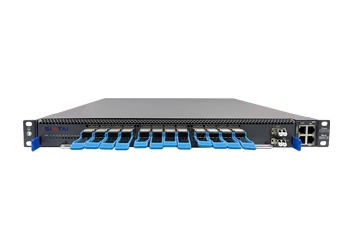The integrated WDM System offers 1U 48X10G→480G System, 1U 12X100G→1.2T System and 1U 12X400G→4.8T System which supports single-channel access rate up to 10 Gbit/s and adaptive access to all types of services at rates of 10 Gbit/s or lower (like FE/GE/10GE LAN, 10GE WAN, STM-1~64, etc.) and 40GE, 100GE, 400GE and other service types.
OTNS8600P integrated WDM equipment has the outstanding characteristics of large capacity, small size, low energy consumption and high performance, The equipment adopts high-density optoelectronic integration technology to avoid complex patch cords connection. It is easy to form an end-to-end complete WDM transmission scheme, which brings super large transmission capacity, perfectly matches the installation conditions of data center room, and simple management mode, which brings the ultimate user experience to DCI bearer network in metropolitan area.



supports mixed transmission of multiple services, including 40GE, 100GE and other service types. The service interface and quantity can be flexibly customized by customers
maximum transmission capacity of 1RU is 1.2Tbps (12*100G), and the transmission capacity can be effectively extended to 2.4Tbps of 1 fiber through device stacking
no complex photoelectric cross with transparent transmission of services, and complete physical isolation of service ports, which improves the network security
supports 1+1 line protection at optical cable side, and automatically selects transmission route to improve network reliability
supports in band monitoring channel, and the whole network SNMP management can be realized by optical path connection
Inter-data center interconnect is the connection between two data centers or two buildings within a large data center campus. These inter-data center interconnects are typically between 10km to 80km. Industry people refer to data center interconnect as DCI.

Data center interconnect refers to the networking of two or more different data centers to achieve business or IT objectives. This interconnectivity between separate data centers enables them to work together, share resources and/or pass workloads between one another.
A data center interconnect is mainly accomplished using networking tools and techniques along with supported software and data center management processes.
Products that were only used within the data center are gaining reach, and they’re running up against coherent solutions that were formerly only used for long distances. Due to the increasing bandwidth and decreasing cost, coherent is being pulled closer into the data center.
SINTAI 1.6T transponder is an OTN transmission platform customized for Data Center Interconnect (DCI) applications. it represents a best-in-class alternative to Compact DCI systems by providing not just the capacity required to meet interconnection needs but also the flexibility, manageability, ease of use and cost-efficiency that make it ideal for data center interconnection. It's up to eight single wavelength 200G channels, with 8x 200G CFP2 coherent optics uplinks on the line side, and 16x 100G QSFP28 on the client side.
SINTAI 1.6T transponder is widely applicable to DCI scenarios for industries and enterprises with high digitalization, including IXPs, finance, large enterprises and etc.It also enables easy scaling of existing network capacity without replacing exiting OTN/DWDM infrastructure.
| Features of Sintai DCI Equipment | |
| High transport capacity of 1.6T in 1U chassis | Individually controlled dual AC power supply and fan unit |
| Support 16x 100G QSFP28 client interfaces | Coherent detection removes the need for dispersion compensation |
| Support 8x 8QAM/16QAM modulation coherent CFP2 | Single-fiber operation on all line rates from 10G to 800G |
| line interfaces | Add/drop of any service at any location, use for multicast distribution among data centers |
| Support WEB, SNMP v2 management | Easy to install and commission—lowers OPEX |
| Support GCC0/1/2 in-band management | Lowest equipment cost per 100G |
Dense Wavelength Division Multiplexing (DWDM) has long been the technology of choice for transporting large amounts of data between sites. The main advantage is that it increases bandwidth by allowing different data streams to be sent simultaneously over a single optical fiber network.
The channel space of DWDM is more closeness, so choose the C-band (1530 nm-1565 nm) and L-band (1570 nm-1610 nm) transmission windows.
Today's DWDM systems typically support 96 channels spaced at 0.8 nm apart within the 1550 nm C-Band spectrum. Because of this, DWDM systems can transmit a huge quantity of data through a single fiber link as they allow for many more wavelengths to be packed onto the same fiber